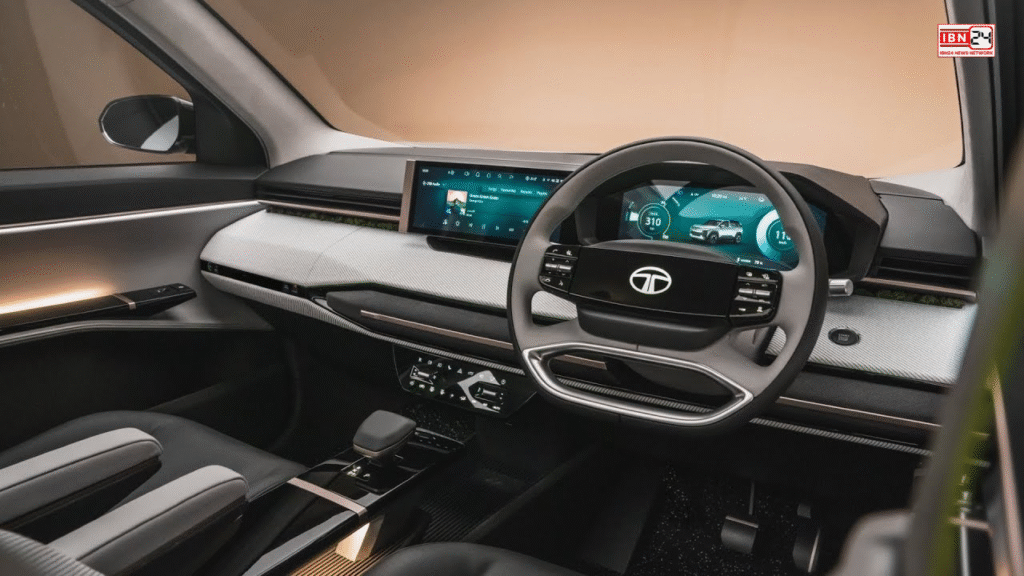Tata Motors Unveils 5 Year: Tata Motors Electric Vehicle
Tata Motors, India’s leading electric vehicle (EV) manufacturer, has announced a bold investment plan worth ₹350 billion ($4.1 billion) over the next five years. This massive capital commitment is aimed at expanding its EV portfolio, upgrading its technology offerings, and solidifying its top spot in India’s rapidly evolving clean mobility market.
The announcement was made during Tata Motors’ Investor Day 2025, where the company laid out its roadmap for future growth amid growing competition and stricter environmental regulations.
Aiming for EV Dominance in a Growing Market
India, now the third-largest car market in the world, is witnessing a swift transition toward green mobility. The government aims to have electric vehicles account for 30% of all car sales by 2030, and is implementing stricter emission norms starting from 2027.
Tata Motors, which currently leads the Indian EV segment with models like the Nexon EV and Tiago EV, is determined to stay ahead in the game. As part of its new strategy, the company plans to expand its product lineup from 8 to 15 models, which includes both new EVs and compressed natural gas (CNG) vehicles.
Key Focus Areas of the Investment Plan:
- Launch of 7 new electric vehicles
- Introduction of more CNG-powered models
- Continued development in connected car technology
- Enhanced battery management systems and charging infrastructure support
- More competitive features to match global standards
By focusing on both affordability and innovation, Tata Motors wants to cater to India’s diverse customer base while aligning with sustainability goals.
Strong Financial Commitment, But No Yearly Breakdown

While Tata Motors did not provide specific annual investment figures for the current fiscal year ending in March 2026, it previously disclosed that ₹80 billion would be spent across its domestic business operations during this period — including commercial vehicles, passenger vehicles, and EVs.
This capital infusion reflects Tata’s long-term commitment to electrification and technology-led transformation across all verticals.
Rising Competition Challenges Tata’s Lead
Tata Motors has enjoyed a head start in India’s electric vehicle space, thanks to early product launches and local manufacturing advantages. However, competition is intensifying.
Rival Mahindra & Mahindra has gained ground in the traditional internal combustion engine (ICE) market, overtaking Tata in some segments. Meanwhile, MG Motor India, backed by Chinese automaker SAIC, has emerged as a formidable EV challenger.
MG’s new “Windsor” EV model has reportedly outsold Tata’s offerings since late 2024, signaling a shift in consumer preferences. Global automakers like Hyundai and BYD are also aggressively expanding their EV footprint in India, offering better range, faster charging, and more connected features.
Market Share Targets Remain Ambitious
Despite the increased competition, Tata Motors remains confident about its future. The company is targeting a 16% market share by March 2027, and expects to reach 18%-20% by March 2030, driven primarily by new EV launches and technological upgrades.
This shows Tata’s intent to not just retain its leadership in the EV space, but also to compete strongly in the broader automobile market — including premium and commercial segments.
Aligning with India’s Green Goals
India’s transportation sector is undergoing a major shift toward sustainability. The government has introduced multiple incentives under its FAME (Faster Adoption and Manufacturing of Hybrid and Electric Vehicles) scheme and recently announced production-linked incentives (PLIs) for battery manufacturing.
With this supportive policy environment, Tata Motors’ focus on electric and CNG vehicles is strategically aligned with national priorities. The company is also working on building a robust charging ecosystem, including public-private partnerships and collaborations with Tata Power.
Final Thoughts
Tata Motors’ decision to invest ₹35,000 crore in the next five years underscores its ambition to lead India’s EV transformation. While challenges from rivals like Mahindra and MG Motor are real, Tata’s early-mover advantage, growing product range, and brand trust place it in a strong position.
As India’s clean mobility mission gains pace, companies like Tata Motors will play a pivotal role in shaping the country’s automotive future.
For instant news updates, subscribe to the IBN24 NEWS NETWORK YouTube channel
Channel link: https://youtube.com/@IBN24NewsNetwork?si=ofbILODmUt20-zC3
Read Also This article : MacOS 26 Update Marks: Intel Macs Won’t Get macOS Updates After Version 26